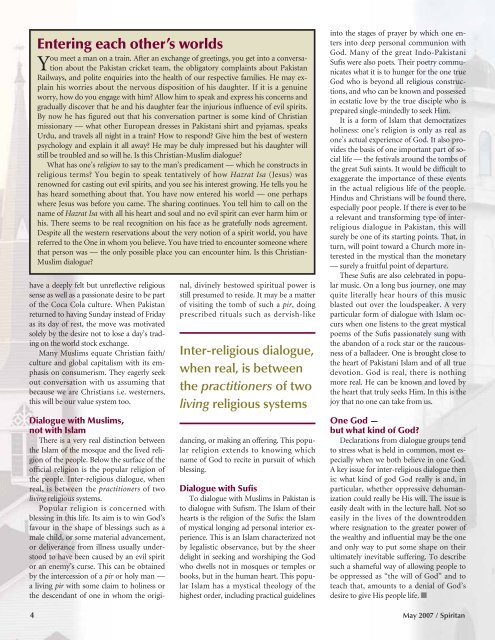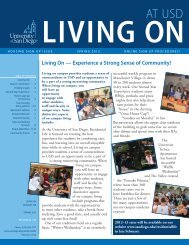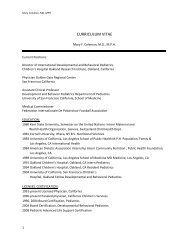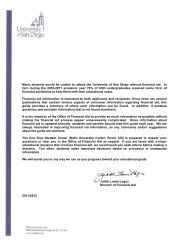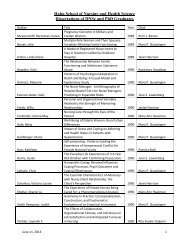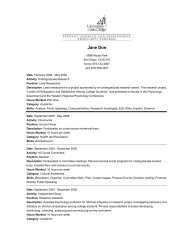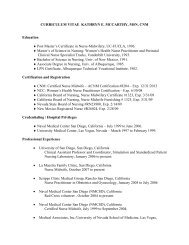Come Holy Spirit - University of San Diego
Come Holy Spirit - University of San Diego
Come Holy Spirit - University of San Diego
You also want an ePaper? Increase the reach of your titles
YUMPU automatically turns print PDFs into web optimized ePapers that Google loves.
Entering each other’s worlds<br />
You meet a man on a train. After an exchange <strong>of</strong> greetings, you get into a conversation<br />
about the Pakistan cricket team, the obligatory complaints about Pakistan<br />
Railways, and polite enquiries into the health <strong>of</strong> our respective families. He may explain<br />
his worries about the nervous disposition <strong>of</strong> his daughter. If it is a genuine<br />
worry, how do you engage with him? Allow him to speak and express his concerns and<br />
gradually discover that he and his daughter fear the injurious influence <strong>of</strong> evil spirits.<br />
By now he has figured out that his conversation partner is some kind <strong>of</strong> Christian<br />
missionary — what other European dresses in Pakistani shirt and pyjamas, speaks<br />
Urdu, and travels all night in a train? How to respond? Give him the best <strong>of</strong> western<br />
psychology and explain it all away? He may be duly impressed but his daughter will<br />
still be troubled and so will he. Is this Christian-Muslim dialogue?<br />
What has one’s religion to say to the man’s predicament — which he constructs in<br />
religious terms? You begin to speak tentatively <strong>of</strong> how Hazrat Isa (Jesus) was<br />
renowned for casting out evil spirits, and you see his interest growing. He tells you he<br />
has heard something about that. You have now entered his world — one perhaps<br />
where Jesus was before you came. The sharing continues. You tell him to call on the<br />
name <strong>of</strong> Hazrat Isa with all his heart and soul and no evil spirit can ever harm him or<br />
his. There seems to be real recognition on his face as he gratefully nods agreement.<br />
Despite all the western reservations about the very notion <strong>of</strong> a spirit world, you have<br />
referred to the One in whom you believe. You have tried to encounter someone where<br />
that person was — the only possible place you can encounter him. Is this Christian-<br />
Muslim dialogue?<br />
have a deeply felt but unreflective religious<br />
sense as well as a passionate desire to be part<br />
<strong>of</strong> the Coca Cola culture. When Pakistan<br />
returned to having Sunday instead <strong>of</strong> Friday<br />
as its day <strong>of</strong> rest, the move was motivated<br />
solely by the desire not to lose a day’s trading<br />
on the world stock exchange.<br />
Many Muslims equate Christian faith/<br />
culture and global capitalism with its emphasis<br />
on consumerism. They eagerly seek<br />
out conversation with us assuming that<br />
because we are Christians i.e. westerners,<br />
this will be our value system too.<br />
Dialogue with Muslims,<br />
not with Islam<br />
There is a very real distinction between<br />
the Islam <strong>of</strong> the mosque and the lived religion<br />
<strong>of</strong> the people. Below the surface <strong>of</strong> the<br />
<strong>of</strong>ficial religion is the popular religion <strong>of</strong><br />
the people. Inter-religious dialogue, when<br />
real, is between the practitioners <strong>of</strong> two<br />
living religious systems.<br />
Popular religion is concerned with<br />
blessing in this life. Its aim is to win God’s<br />
favour in the shape <strong>of</strong> blessings such as a<br />
male child, or some material advancement,<br />
or deliverance from illness usually understood<br />
to have been caused by an evil spirit<br />
or an enemy’s curse. This can be obtained<br />
by the intercession <strong>of</strong> a pir or holy man —<br />
a living pir with some claim to holiness or<br />
the descendant <strong>of</strong> one in whom the original,<br />
divinely bestowed spiritual power is<br />
still presumed to reside. It may be a matter<br />
<strong>of</strong> visiting the tomb <strong>of</strong> such a pir, doing<br />
prescribed rituals such as dervish-like<br />
Inter-religious dialogue,<br />
when real, is between<br />
the practitioners <strong>of</strong> two<br />
living religious systems<br />
dancing, or making an <strong>of</strong>fering. This popular<br />
religion extends to knowing which<br />
name <strong>of</strong> God to recite in pursuit <strong>of</strong> which<br />
blessing.<br />
Dialogue with Sufis<br />
To dialogue with Muslims in Pakistan is<br />
to dialogue with Sufism. The Islam <strong>of</strong> their<br />
hearts is the religion <strong>of</strong> the Sufis: the Islam<br />
<strong>of</strong> mystical longing ad personal interior experience.<br />
This is an Islam characterized not<br />
by legalistic observance, but by the sheer<br />
delight in seeking and worshiping the God<br />
who dwells not in mosques or temples or<br />
books, but in the human heart. This popular<br />
Islam has a mystical theology <strong>of</strong> the<br />
highest order, including practical guidelines<br />
into the stages <strong>of</strong> prayer by which one enters<br />
into deep personal communion with<br />
God. Many <strong>of</strong> the great Indo-Pakistani<br />
Sufis were also poets. Their poetry communicates<br />
what it is to hunger for the one true<br />
God who is beyond all religious constructions,<br />
and who can be known and possessed<br />
in ecstatic love by the true disciple who is<br />
prepared single-mindedly to seek Him.<br />
It is a form <strong>of</strong> Islam that democratizes<br />
holiness: one’s religion is only as real as<br />
one’s actual experience <strong>of</strong> God. It also provides<br />
the basis <strong>of</strong> one important part <strong>of</strong> social<br />
life — the festivals around the tombs <strong>of</strong><br />
the great Sufi saints. It would be difficult to<br />
exaggerate the importance <strong>of</strong> these events<br />
in the actual religious life <strong>of</strong> the people.<br />
Hindus and Christians will be found there,<br />
especially poor people. If there is ever to be<br />
a relevant and transforming type <strong>of</strong> interreligious<br />
dialogue in Pakistan, this will<br />
surely be one <strong>of</strong> its starting points. That, in<br />
turn, will point toward a Church more interested<br />
in the mystical than the monetary<br />
— surely a fruitful point <strong>of</strong> departure.<br />
These Sufis are also celebrated in popular<br />
music. On a long bus journey, one may<br />
quite literally hear hours <strong>of</strong> this music<br />
blasted out over the loudspeaker. A very<br />
particular form <strong>of</strong> dialogue with Islam occurs<br />
when one listens to the great mystical<br />
poems <strong>of</strong> the Sufis passionately sung with<br />
the abandon <strong>of</strong> a rock star or the raucousness<br />
<strong>of</strong> a balladeer. One is brought close to<br />
the heart <strong>of</strong> Pakistani Islam and <strong>of</strong> all true<br />
devotion. God is real, there is nothing<br />
more real. He can be known and loved by<br />
the heart that truly seeks Him. In this is the<br />
joy that no one can take from us.<br />
One God —<br />
but what kind <strong>of</strong> God?<br />
Declarations from dialogue groups tend<br />
to stress what is held in common, most especially<br />
when we both believe in one God.<br />
A key issue for inter-religious dialogue then<br />
is: what kind <strong>of</strong> god God really is and, in<br />
particular, whether oppressive dehumanization<br />
could really be His will. The issue is<br />
easily dealt with in the lecture hall. Not so<br />
easily in the lives <strong>of</strong> the downtrodden<br />
where resignation to the greater power <strong>of</strong><br />
the wealthy and influential may be the one<br />
and only way to put some shape on their<br />
ultimately inevitable suffering. To describe<br />
such a shameful way <strong>of</strong> allowing people to<br />
be oppressed as “the will <strong>of</strong> God” and to<br />
teach that, amounts to a denial <strong>of</strong> God’s<br />
desire to give His people life. ■<br />
4 May 2007 / <strong>Spirit</strong>an


